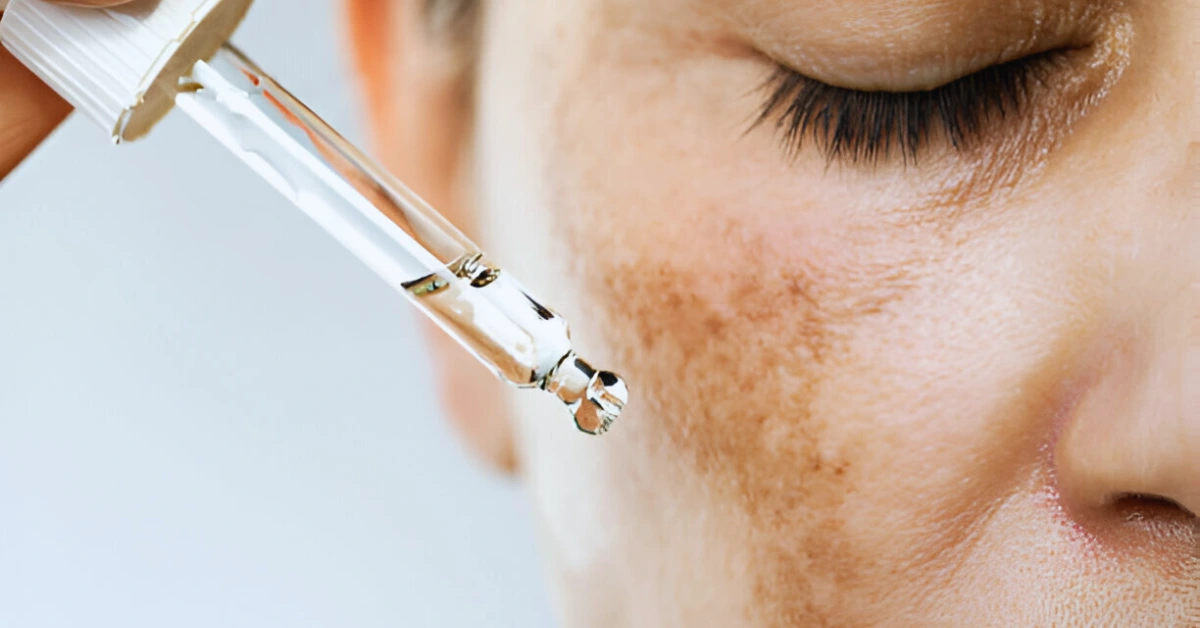Melasma, a common skin condition characterized by dark patches on the face, affects millions worldwide. These patches can significantly impact self-esteem, leading many to seek effective treatment options. In this article, we’ll explore what melasma is, its causes, and how to cure it from the inside through dietary changes.
Key Takeaways
- Melasma is caused by the overproduction of melanin, triggered by hormonal changes, sun exposure, and genetics.
- A diet rich in antioxidants, vitamin C, vitamin E, and beta-carotene can help manage melasma symptoms.
- Processed foods, sugary snacks, and excessive caffeine and alcohol consumption may worsen melasma and should be avoided.
What Is Melasma?
Melasma is a skin disorder that causes brown or grayish patches to develop on the face. It occurs when the body produces too much melanin, the pigment responsible for skin color. Melasma is more common in women, especially during pregnancy or when using hormonal contraceptives.
Also Read: How To Get Rid Of Textured Skin?
Melasma Causes
Several factors contribute to the development of melasma, including:
- Hormonal changes: Fluctuations in estrogen and progesterone can trigger melasma, which is why it’s common during pregnancy.
- Sun exposure: UV radiation stimulates melanin production, worsening melasma symptoms.
- Genetic predisposition: Some people are more likely to develop melasma due to their genes.
How to Cure Melasma from the Inside
To effectively treat melasma, it’s essential to adopt a holistic approach that focuses on internal healing. One key aspect is maintaining a healthy diet that promotes skin health and reduces inflammation.
Incorporate antioxidant-rich foods into your diet, such as berries, leafy greens, and citrus fruits. These foods help combat oxidative stress and support skin rejuvenation. Consume foods high in vitamin C, vitamin E, and beta-carotene to promote collagen production and protect against UV damage.
Consider including foods with natural skin-lightening properties, like turmeric, licorice root, and green tea. These ingredients may help reduce the appearance of dark patches and even out skin tone.
What Food Is Bad For Melasma?
While some foods can help manage melasma, others may exacerbate symptoms and should be avoided. Processed foods, sugary snacks, and refined carbohydrates can contribute to inflammation and negatively impact skin health.
Excessive caffeine and alcohol consumption may also worsen melasma. These substances can dehydrate the skin and cause flushing, making dark patches more noticeable. Similarly, spicy foods and hot beverages can trigger flushing and aggravate melasma symptoms.
Conclusion
Melasma is a complex skin condition caused by a combination of factors, including hormonal changes, sun exposure, and genetics. While it may not be possible to completely eliminate melasma, adopting a comprehensive approach that includes a healthy diet can significantly improve its appearance.
By incorporating antioxidant-rich foods, vitamins C and E, and natural skin-lightening ingredients into your diet, you can support your skin’s health from the inside out. Remember to avoid processed foods, excessive caffeine and alcohol, and spicy foods that may worsen melasma symptoms.
With patience, consistency, and a holistic approach, you can manage melasma and regain confidence in your skin.
Read More: How To Make Turmeric Paste For Skin?
FAQs
A: While stress doesn’t directly cause melasma, it can worsen symptoms by triggering hormonal imbalances and inflammation.
A: Supplements like vitamin C, vitamin E, and glutathione may support skin health and reduce melasma symptoms.
A: Improvements in melasma may take several weeks to months to become noticeable, as skin cells need time to regenerate.
A: Some makeup products can irritate the skin and worsen melasma. Opt for non-comedogenic, mineral-based products to minimize irritation.
Citations:
- “Melasma.” American Academy of Dermatology, www.aad.org/public/diseases/a-z/melasma-overview.

